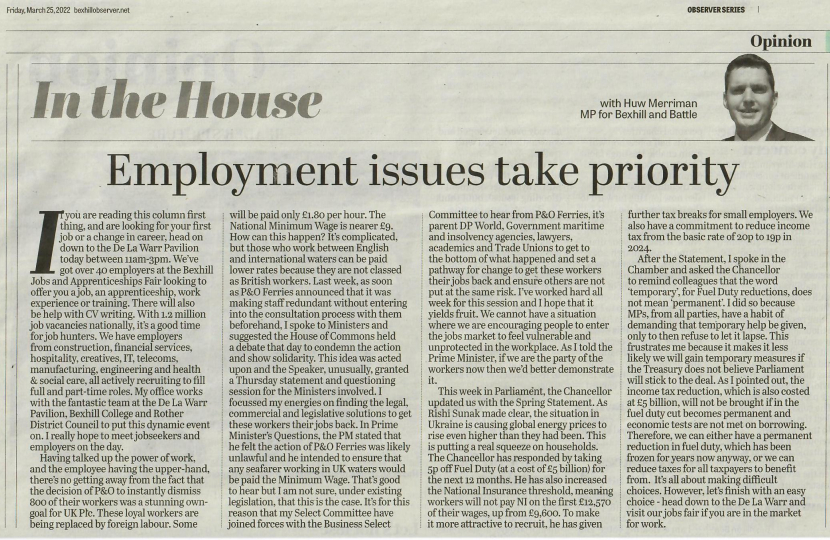
If you are reading this column first thing, and are looking for your first job or a change in career, head on down to the De La Warr Pavilion today between 11am-3pm. We’ve got over 40 employers at the Bexhill Jobs and Apprenticeships Fair looking to offer you a job, an apprenticeship, work experience or training. There will also be help with CV writing. With 1.2 million job vacancies nationally, it’s a good time for job hunters. We have employers from construction, financial services, hospitality, creatives, IT, telecoms, manufacturing, engineering and health & social care, all actively recruiting to fill full and part-time roles. My office works with the fantastic team at the De La Warr Pavilion, Bexhill College and Rother District Council to put this dynamic event on. I really hope to meet jobseekers and employers on the day.
Having talked up the power of work, and the employee having the upper-hand, there’s no getting away from the fact that the decision of P&O to instantly dismiss 800 of their workers was a stunning own-goal for UK Plc. These loyal workers are being replaced by foreign labour. Some will be paid only £1.80 per hour. The National Minimum Wage is nearer £9. How can this happen? It’s complicated, but those who work between English and international waters can be paid lower rates because they are not classed as British workers. Last week, as soon as P&O Ferries announced that it was making staff redundant without entering into the consultation process with them beforehand, I spoke to Ministers and suggested the House of Commons held a debate that day to condemn the action and show solidarity. This idea was acted upon and the Speaker, unusually, granted a Thursday statement and questioning session for the Ministers involved. I focussed my energies on finding the legal, commercial and legislative solutions to get these workers their jobs back. In Prime Minister’s Questions, the PM stated that he felt the action of P&O Ferries was likely unlawful and he intended to ensure that any seafarer working in UK waters would be paid the Minimum Wage. That’s good to hear but I am not sure, under existing legislation, that this is the case. It’s for this reason that my Select Committee have joined forces with the Business Select Committee to hear from P&O Ferries, it’s parent DP World, Government maritime and insolvency agencies, lawyers, academics and Trade Unions to get to the bottom of what happened and set a pathway for change to get these workers their jobs back and ensure others are not put at the same risk. I’ve worked hard all week for this session and I hope that it yields fruit. We cannot have a situation where we are encouraging people to enter the jobs market to feel vulnerable and unprotected in the workplace. As I told the Prime Minister, if we are the party of the workers now then we’d better demonstrate it.
This week in Parliament, the Chancellor updated us with the Spring Statement. As Rishi Sunak made clear, the situation in Ukraine is causing global energy prices to rise even higher than they had been. This is putting a real squeeze on households. The Chancellor has responded by taking 5p off Fuel Duty (at a cost of £5 billion) for the next 12 months. He has also increased the National Insurance threshold, meaning workers will not pay NI on the first £12,570 of their wages, up from £9,600. To make it more attractive to recruit, he has given further tax breaks for small employers. We also have a commitment to reduce income tax from the basic rate of 20p to 19p in 2024.
After the Statement, I spoke in the Chamber and asked the Chancellor to remind colleagues that the word ‘temporary’, for Fuel Duty reductions, does not mean ‘permanent’. I did so because MPs, from all parties, have a habit of demanding that temporary help be given, only to then refuse to let it lapse. This frustrates me because it makes it less likely we will gain temporary measures if the Treasury does not believe Parliament will stick to the deal. As I pointed out, the income tax reduction, which is also costed at £5 billion, will not be brought if in the fuel duty cut becomes permanent and economic tests are not met on borrowing. Therefore, we can either have a permanent reduction in fuel duty, which has been frozen for years now anyway, or we can reduce taxes for all taxpayers to benefit from. It’s all about making difficult choices. However, let’s finish with an easy choice - head down to the De La Warr and visit our jobs fair if you are in the market for work.



